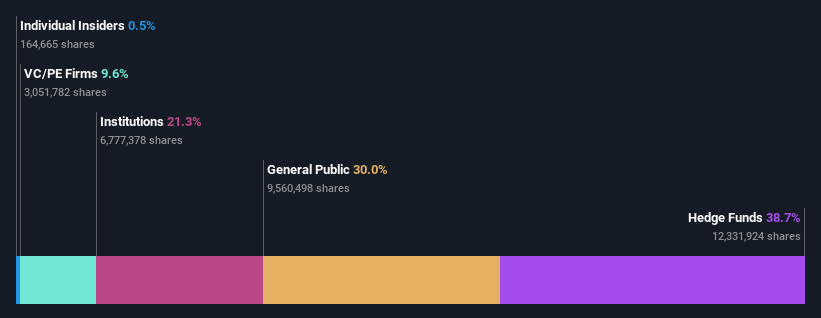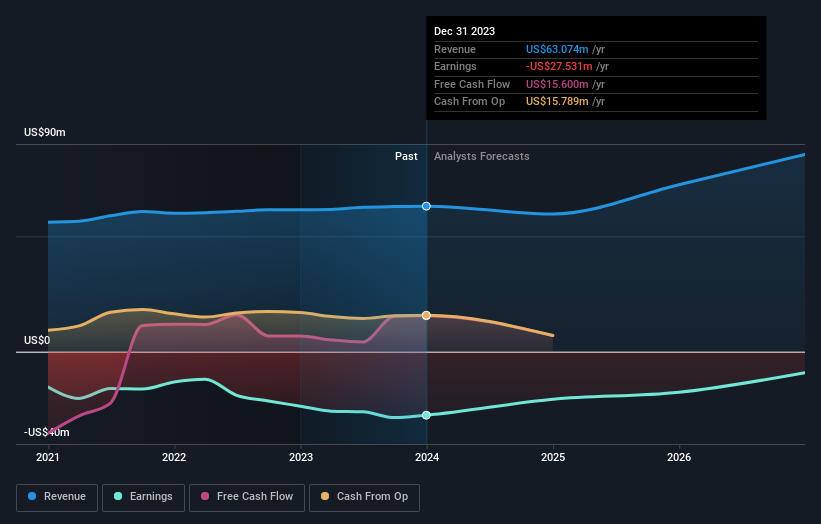HLS Therapeutics Inc.'s (TSE:HLS) recent 11% pullback adds to one-year year losses, hedge funds owners may take drastic measures
Key Insights
- Institutions' substantial holdings in HLS Therapeutics implies that they have significant influence over the company's share price
- 58% of the business is held by the top 4 shareholders
- Using data from analyst forecasts alongside ownership research, one can better assess the future performance of a company
Every investor in HLS Therapeutics Inc. (TSE:HLS) should be aware of the most powerful shareholder groups. And the group that holds the biggest piece of the pie are hedge funds with 39% ownership. That is, the group stands to benefit the most if the stock rises (or lose the most if there is a downturn).
And hedge funds investors endured the highest losses after the company's share price fell by 11% last week. This set of investors may especially be concerned about the current loss, which adds to a one-year loss of 8.0% for shareholders. Hedge funds are often aggressively managed, usually with the goal of focusing on short-term profits. Because of their large stake in HLS Therapeutics, they hold a lot of power, and persistent under performance could lead to them influencing management decisions that might diverge from the company's long-term goals.
Let's take a closer look to see what the different types of shareholders can tell us about HLS Therapeutics.
See our latest analysis for HLS Therapeutics

What Does The Institutional Ownership Tell Us About HLS Therapeutics?
Institutional investors commonly compare their own returns to the returns of a commonly followed index. So they generally do consider buying larger companies that are included in the relevant benchmark index.
As you can see, institutional investors have a fair amount of stake in HLS Therapeutics. This can indicate that the company has a certain degree of credibility in the investment community. However, it is best to be wary of relying on the supposed validation that comes with institutional investors. They too, get it wrong sometimes. When multiple institutions own a stock, there's always a risk that they are in a 'crowded trade'. When such a trade goes wrong, multiple parties may compete to sell stock fast. This risk is higher in a company without a history of growth. You can see HLS Therapeutics' historic earnings and revenue below, but keep in mind there's always more to the story.

Our data indicates that hedge funds own 39% of HLS Therapeutics. That catches my attention because hedge funds sometimes try to influence management, or bring about changes that will create near term value for shareholders. Polar Asset Management Partners Inc. is currently the company's largest shareholder with 20% of shares outstanding. For context, the second largest shareholder holds about 19% of the shares outstanding, followed by an ownership of 10% by the third-largest shareholder.
On looking further, we found that 58% of the shares are owned by the top 4 shareholders. In other words, these shareholders have a meaningful say in the decisions of the company.
Researching institutional ownership is a good way to gauge and filter a stock's expected performance. The same can be achieved by studying analyst sentiments. There are a reasonable number of analysts covering the stock, so it might be useful to find out their aggregate view on the future.
Insider Ownership Of HLS Therapeutics
The definition of company insiders can be subjective and does vary between jurisdictions. Our data reflects individual insiders, capturing board members at the very least. Company management run the business, but the CEO will answer to the board, even if he or she is a member of it.
I generally consider insider ownership to be a good thing. However, on some occasions it makes it more difficult for other shareholders to hold the board accountable for decisions.
Our information suggests that HLS Therapeutics Inc. insiders own under 1% of the company. It seems the board members have no more than CA$787k worth of shares in the CA$152m company. Many tend to prefer to see a board with bigger shareholdings. A good next step might be to take a look at this free summary of insider buying and selling.
General Public Ownership
With a 30% ownership, the general public, mostly comprising of individual investors, have some degree of sway over HLS Therapeutics. While this group can't necessarily call the shots, it can certainly have a real influence on how the company is run.
Private Equity Ownership
With a stake of 9.6%, private equity firms could influence the HLS Therapeutics board. Some investors might be encouraged by this, since private equity are sometimes able to encourage strategies that help the market see the value in the company. Alternatively, those holders might be exiting the investment after taking it public.
Next Steps:
While it is well worth considering the different groups that own a company, there are other factors that are even more important. Be aware that HLS Therapeutics is showing 1 warning sign in our investment analysis , you should know about...
Ultimately the future is most important. You can access this free report on analyst forecasts for the company.
NB: Figures in this article are calculated using data from the last twelve months, which refer to the 12-month period ending on the last date of the month the financial statement is dated. This may not be consistent with full year annual report figures.
Valuation is complex, but we're here to simplify it.
Discover if HLS Therapeutics might be undervalued or overvalued with our detailed analysis, featuring fair value estimates, potential risks, dividends, insider trades, and its financial condition.
Access Free AnalysisHave feedback on this article? Concerned about the content? Get in touch with us directly. Alternatively, email editorial-team (at) simplywallst.com.
This article by Simply Wall St is general in nature. We provide commentary based on historical data and analyst forecasts only using an unbiased methodology and our articles are not intended to be financial advice. It does not constitute a recommendation to buy or sell any stock, and does not take account of your objectives, or your financial situation. We aim to bring you long-term focused analysis driven by fundamental data. Note that our analysis may not factor in the latest price-sensitive company announcements or qualitative material. Simply Wall St has no position in any stocks mentioned.
About TSX:HLS
HLS Therapeutics
A specialty pharmaceutical company, acquires and commercializes pharmaceutical products for the treatment of psychiatric disorders, central nervous system, and cardiovascular disease in Canada, the United States, and internationally.
Fair value with mediocre balance sheet.
Similar Companies
Market Insights
Community Narratives



